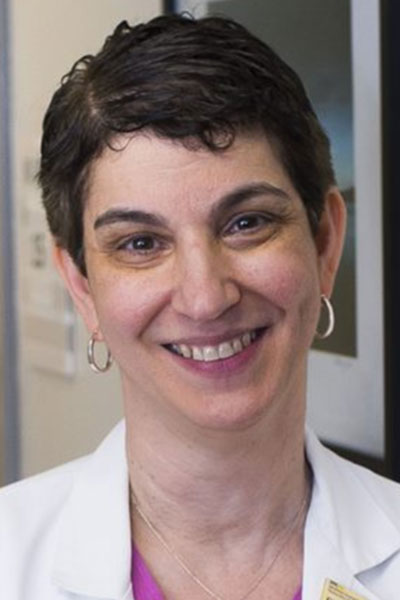Pathogenic germline alterations in certain genes can increase inherited breast cancer risk. About 5 to 10 percent of all breast cancer cases are hereditary — driven by pathogenic germline alterations, most commonly in BRCA1/2. Germline mutations also inform treatment choice, as patients with pathogenic germline BRCA1/2 mutations may be candidates for poly ADP-ribose polymerase inhibitor-based treatment.
During the 2024 San Antonio Breast Cancer Symposium®, a panel of experts will discuss new data on classifying BRCA2 germline variants, risk prediction models, and therapeutic implications of reversion mutations in BRCA1/2 during Risk Reduction and Early Detection: The Future of Cancer Genetics Is Here. The session will take place Thursday, December 12, from 12:30 to 1:45 p.m. CT in Stars at Night Ballroom 3-4 at the Henry B. Gonzalez Convention Center.

The topic of hereditary risk in breast cancer is important and timely, said session moderator Claudine Isaacs, MD, Professor of Medicine and Oncology and Leader of the Clinical Breast Cancer Program at the Lombardi Comprehensive Cancer Center at Georgetown University.
“We are increasingly understanding — in all aspects of medicine — the importance of personalizing our treatments, and our prevention and screening options, to actualize the promise of precision medicine,” Dr. Isaacs said.
Fergus Couch, PhD, Professor and Chair of the Division of Experimental Pathology and Laboratory Medicine at the Mayo Clinic Rochester, will discuss saturation genome editing-based functional and clinical classification of variants of unknown significance (VUSs) in BRCA2.
“Clinicians talk to their patients about genetic testing, test findings and interpretation, and risk assessment based on genetic testing results,” Dr. Isaacs said. “Often, testing results for familial or inherited cancer susceptibility genes like BRCA1/2 include VUSs. While most VUSs are reclassified as benign — meaning they have no clinical impact for the individual — some will be classified as intermediate or higher risk.”
Interpretation of VUSs is challenging in clinical practice, she added.
“The work that Dr. Couch and his colleagues are doing to try to determine in a timely fashion the clinical significance of VUSs will be critically important for clinical decision-making around risk assessment and therapeutic strategies, as well as our discussions with patients regarding prevention or monitoring strategies.”
Antonis C. Antoniou, PhD, Professor of Cancer Risk Prediction in the Department of Public Health and Primary Care, Centre for Cancer Genetic Epidemiology, University of Cambridge, will present updates on risk prediction models.
“This presentation is focused on trying to better individualize breast cancer risk prediction, which can inform both intensification and de-intensification of cancer screening and prevention strategies,” Dr. Isaacs said. “Dr. Antoniou will focus on a risk prediction model that incorporates not only genetic risk related to breast cancer susceptibility genes but also polygenic risk scores. Importantly, the model is also adapted to ethnically diverse populations.”
Katherine Nathanson, MD, Pearl Basser Professor for BRCA-Related Research and Deputy Director of the Abramson Cancer Center at the University of Pennsylvania, will look at reversion mutations in BRCA1/2 in response to therapy and address how genetic testing currently impacts treatment paradigms.
“Many patients who carry germline mutations in BRCA1/2, and in some cases in PALB2, have targeted therapeutic options, both in the metastatic and early-stage settings,” Dr. Isaacs said. “However, resistance mechanisms may develop. Improved understanding of the resistance mechanisms and associated genetic changes can inform the development of novel treatments.”
The session will conclude with a panel discussion that includes the speakers, Dr. Isaacs, and patient advocate Tanja Spanic of Europa Donna Slovenia.
“The topics covered in this session transcend any single discipline,” Dr. Isaacs said. “The practical clinical applicability of this session makes it relevant to a wide spectrum of clinical specialists, including advanced practice providers, nurses, genetic counselors, medical/surgical/radiation oncologists, and breast imagers.”
The session should also be informative for basic/translational science researchers and epidemiologists seeking to understand genetic risk and their therapeutic implications, Dr. Isaacs said.
“We have precision medicine approaches available. If we do not avail ourselves of testing, we are missing the opportunity to treat our patients in the best way possible,” she said. “So, absolutely, the session underscores the importance of testing but more importantly, the session focuses on how we can integrate testing information in a more individualized approach to patient care.”
Access the 2024 SABCS® virtual platform
Watch any sessions you’ve missed and stay connected with fellow attendees in the online platform of the 2024 San Antonio Breast Cancer Symposium®. Recordings of sessions will be available on demand for registered 2024 SABCS® participants until March 31, 2025.

